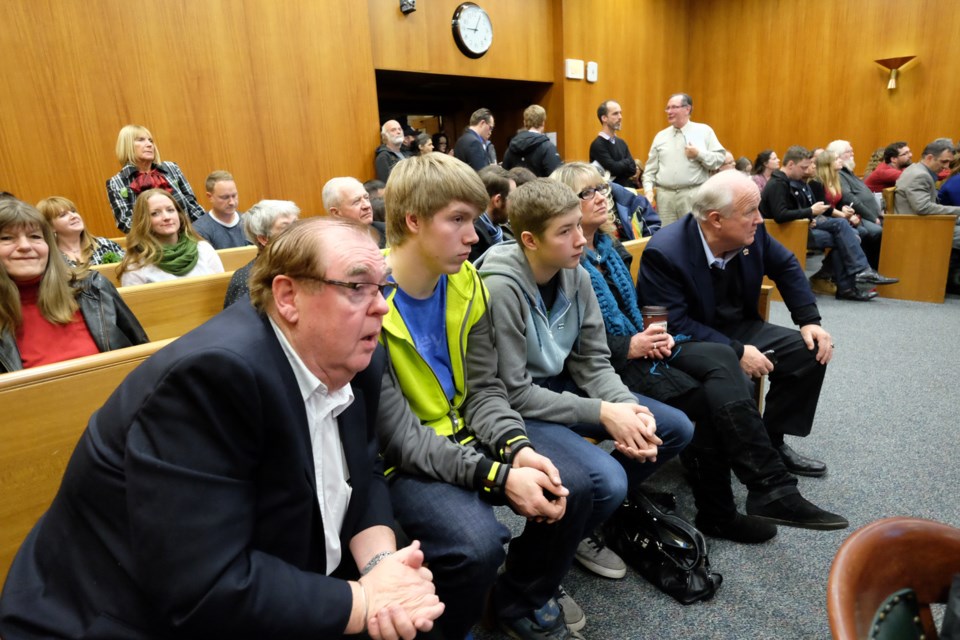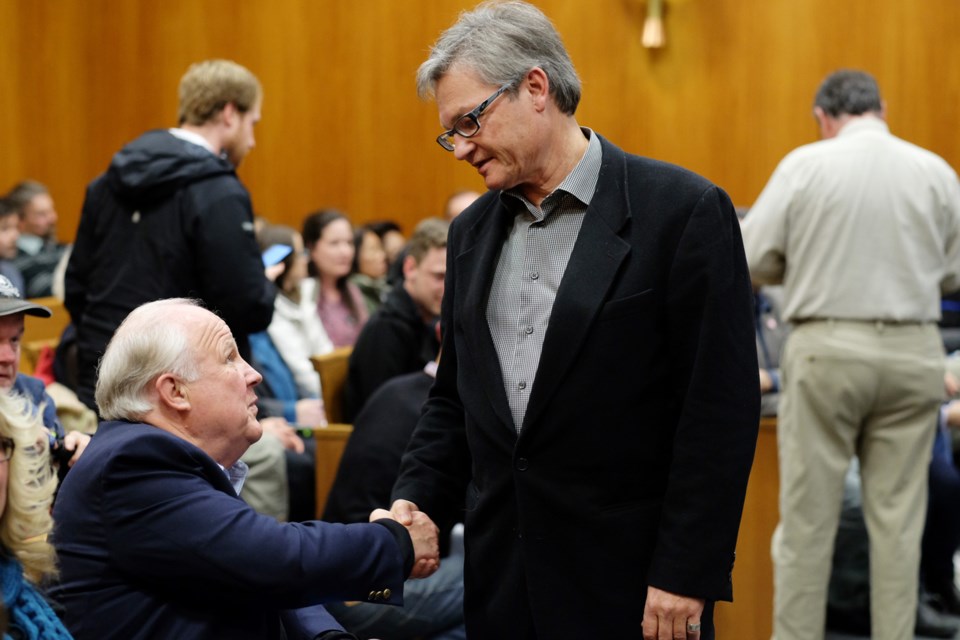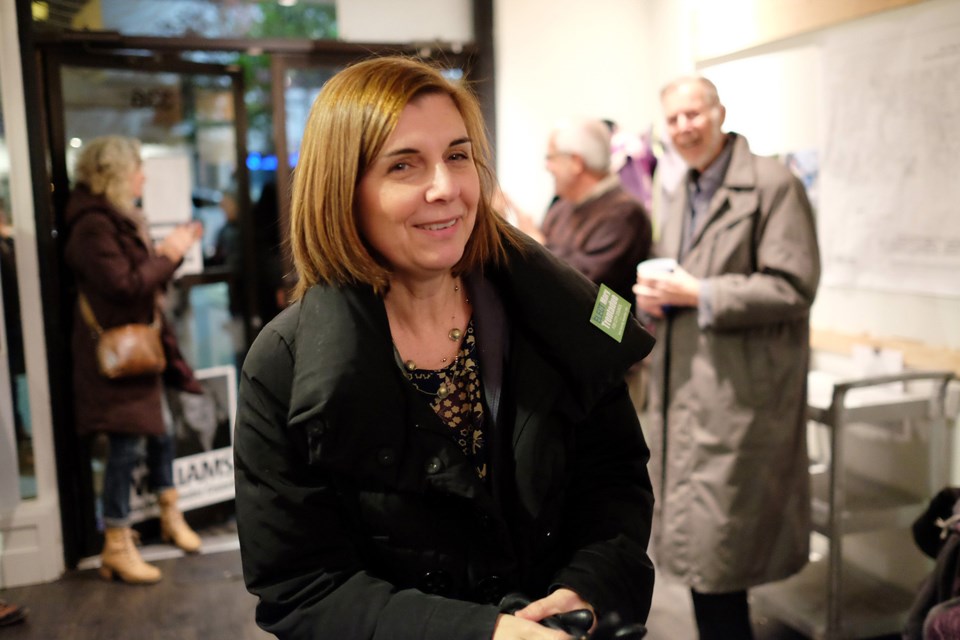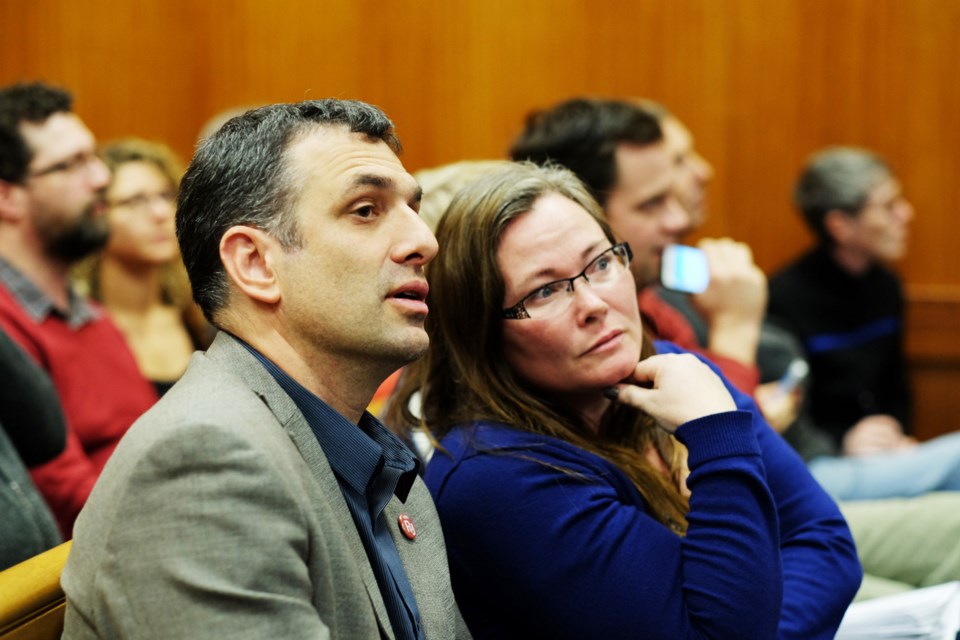The labour “machine” matters in New Westminster elections, according to independent candidates who didn’t win a single seat on city council Saturday.
New Westminster and District Labour Council-endorsed candidates swept city hall and won five of seven seats on the school board, proving that the powerful anointment means something in an NDP stronghold, say the critics.
“I guess slate politics works. It looks like a slate to me from these numbers,” former councillor Cal Donnelly said after the results rolled in Saturday night.
The labour endorses candidates throughout the Lower Mainland. The organization contributes funds, manpower and, through phone calls and mailouts, encourages its many union members to vote for labour-approved candidates who have sought and gone through an approval process.
“I am disappointed that voter turnout didn’t get higher, and I am disappointed that it’s a complete sweep,” said McBride-Sapperton Residents’ Association president Catherine Cartwright, who came just behind newcomer Mary Trentadue by 352 votes, according to preliminary results.
Tourism New Westminster executive director Tej Kainth was just 54 votes behind Cartwright.
Although candidates talked about the need for balance at city council, that didn’t translate into votes at the polls.
“I can’t tell you what happened because on the street it resonated,” Cartwright said. “Maybe it’s who came to vote and who didn’t?”

(Cal Donnelly watches the election results come in with Wayne Wright.)
Independent candidates provided another perspective on city issues to the debate during the campaign, but that was no match for the money provided by labour, candidate Harm Woldring said.
Woldring said unions contributed more than $30,000 to local candidates in 2011 and he expects that figure to soar this time around.
“It is going to be $80,000 to $100,000,” he predicted. “I spent less than $2,500. I didn’t have a single ad or a single sign in the city.”
Woldring, a downtown businessman who got 1,610 votes, believes a sweep by the labour-endorsed council candidates will be “a disaster” for the city and business in the city. While business had somewhat of a voice with former Coun. Betty McIntosh and Mayor Wayne Wright, Woldring fears that balance will be gone.
“They don’t know a thing about economic development or they wouldn’t be crucifying businesses in this community,” he said. “You can’t run a small business in this community.”
In addition to tightening rules on union financing of election campaigns, Woldring also thinks there’s a need for term limits in civic politics.
“There should be term limits, especially with four-year terms,” he said. “Two terms and you are gone. You shouldn’t be sitting on city council for 20 years, the same with school board.”
First-time candidate David Brett, who placed 10th in the council race, echoed the comments of other candidates who weren’t endorsed by the labour council.
“I am disappointed but not terribly surprised that the slate got in,” he said. “As the race went on, it was apparent there were overwhelming resources, in terms of budgets, advertising, the kind of coordinated campaign.”
According to Brett, first-time candidates were “squired about town by the NDP brass” and introduced to the community.
While “dire consequences” is a bit too strong wording, Brett thinks New Westminster will suffer by having elected a full council of labour-supported candidates, particularly in its relationships with senior levels of government.
“I think he brought a pro-business, can-do attitude and kind of carried the rest of the council on his shoulders,” he said of Wright. “I have heard some of the people on the labour side even say themselves they fear group-think. When you have too many people in strong agreement, you can come to believe the direction you are going is right. If you don’t have any skeptical voice at the table, things can go wrong.”

(Chuck Puchmayr shakes Wayne Wright's hand.)
But labour-council supporters insist it’s not just the union endorsement that made the difference for newcomers in this election. Plain old-fashioned hard work also helped push the newcomers into their seat, they say.
“The district labour council endorsement is a factor, but it is not the most important factor,” said resident Briana Tomkinson, who has a presence in the city’s Twitter community and started a longtime blog on community and civic issues. “The DLC endorsement is a lot of different things, and I don’t think any single one of those things is the silver bullet it’s made out to be.”
The two new district labour-endorsed councillors, Mary Trentadue (a former North Vancouver city councillor who moved to New West about two years ago) and Patrick Johnstone, knocked on thousands of doors, mobilized volunteers and fostered connections to get their name out there, said Tomkinson.
“They campaigned harder, frankly, than most of the non-endorsed candidates,” she said.

(Mary Trentadue, a relative newcomer to New Westminster who was elected to city council, arrives at the labour-endorsed candidates campaign office on Columbia Street on election night.)
Wright, and other independents raised the issue of the labour “machine” during his election campaign. Tomkinson, along with Johnstone, who wrote a lengthy blog about the topic after The Record published three stories, including an editorial on the possibility of having a fully labour-endorsed council, saw the discussion around the labour endorsement as a “sideshow.”
“(It) had nothing to do with issues, particularly for the incumbent candidates that were highlighting the machine as a reason not to pick progressive candidates,” said Tomkinson.
She didn’t want the machine talk to “discount the hard work candidates put in.”
“The new faces on there are really, really good,” she said. “They’ve done their homework; they are not just being floated in and being parachuted in by the DLC and being handed their victory.”
As well, Tomkinson said she didn’t see the same level of energy from the independent candidates.
“It bothers me when you see people giving themselves a pass for not stepping up to the plate,” she said of independent candidates who blame the “machine” for their loss.
Labour-endorsed newly elected councillor Johnstone, an environmental coordinator for the City of Richmond, said you can’t single out any part of the campaign and say it had the single biggest impact.
“You know what made a difference? My domination of the social media in the city during the election made a difference,” he said. “The more than 2,000 doors I knocked on during this election made a difference, the hard work of my brilliant campaign manager. The hard work of all of the volunteers who worked on my campaign made a difference. The 14 hours I spent of the last day before the election running around town, knocking on doors and talking to people, that made a difference.”
Johnstone agreed with Tomkinson, saying the newcomers who didn’t have name recognition worked the hardest to get elected.
Johnstone sought the labour endorsement because he “wanted to run beside Jonathan Cote,” he told The Record.
New Westminster MLA Judy Darcy also campaigned for the 35-year-old mayor-elect to win the seat.
Though New Westminster is a labour stronghold with NDP politicians in Victoria and Ottawa, Darcy said it doesn’t mean labour endorsed candidates can rest on their laurels when it comes to campaigning.
“I worked for a year and a half knocking on doors when I ran provincially, so the fact that it’s been an NDP seat historically doesn’t make it a safe seat forever,” she said. “What matters most in my experience is the face-to-face contact in the community on the doorstep and volunteers.”
The first-term MLA didn’t think having a full labour council at city hall and a majority on school board would negatively impact the city’s dealing with B.C. Liberal provincial government and federal Conservatives, saying Cote had worked as a part of the same team as Wright and they were successful at attracting projects and funding from other levels of government.



